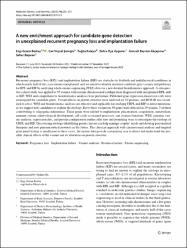A new enrichment approach for candidate gene detection in unexplained recurrent pregnancy loss and implantation failure

View/
Date
2022Author
Berkay, Ezgi GizemSoroğlu, Can Veysel
Kalaycı, Tuğba
Uyguner, Zehra Oya
Akçapınar, Günseli Bayram
Başaran, Seher
Metadata
Show full item recordCitation
Berkay EG, Soroğlu CV, Kalaycı T, Uyguner ZO, Akçapınar GB, Başaran S. A new enrichment approach for candidate gene detection in unexplained recurrent pregnancy loss and implantation failure. Molecular Genetics and Genomics (2023) 298(1): 253–272.Abstract
Recurrent pregnancy loss (RPL) and implantation failure (RIF) are obstacles to livebirth and multifactorial conditions in which nearly half of the cases remain unexplained, and we aimed to identify maternal candidate gene variants and pathways for RPL and RIF by analyzing whole-exome sequencing (WES) data via a new detailed bioinformatics approach. A retrospective cohort study was applied to 35 women with normal chromosomal configuration diagnosed with unexplained RPL and/or RIF. WES and comprehensive bioinformatics analyses were performed. Published gene expression datasets (n = 46) were investigated for candidate genes. Variant effects on protein structure were analyzed for 12 proteins, and BUB1B was visualized in silico. WES and bioinformatics analyses are effective and applicable for studying URPL and RIF to detect mutations, as we suggest new candidates to explain the etiology. Forty-three variants in 39 genes were detected in 29 women, 7 of them contributing to oligogenic inheritance. These genes were related to implantation, placentation, coagulation, metabolism, immune system, embryological development, cell cycle-associated processes, and ovarian functions. WES, genomic variant analyses, expression data, and protein configuration studies offer new and promising ways to investigate the etiology of URPL and RIF. Discovering etiology-identifying genetic factors can help manage couples' needs and develop personalized therapies and new pharmaceutical products in the future. The classical approach with chromosomal analysis and targeted gene panel testing is insufficient in these cases; the exome data provide a promising way to detect and understand the possible clinical effects of the variant and its alteration on protein structure.
Source
Molecular Genetics and GenomicsVolume
298Issue
1URI
https://link.springer.com/article/10.1007/s00438-022-01972-5https://doi.org/10.1007/s00438-022-01972-5
https://hdl.handle.net/20.500.12780/671

















